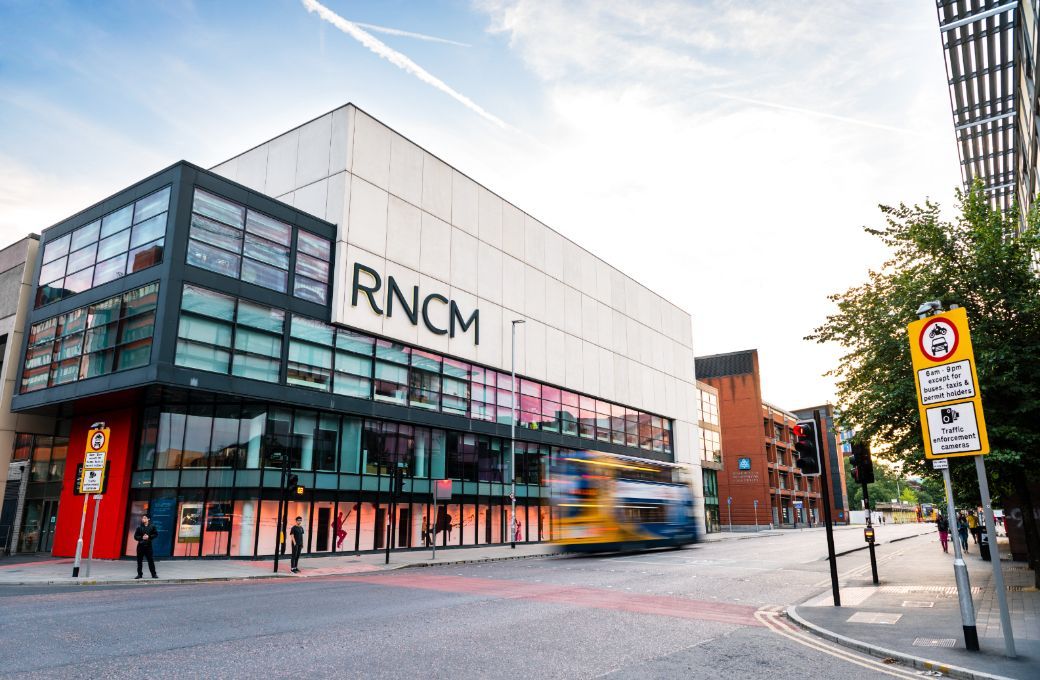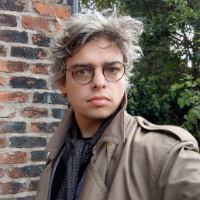It can be easy to be overwhelmed by Manchester’s Oxford Road. Travelling north, the manifold restaurants and shawarma joints of Rusholme suddenly transition into the redbrick Victorian grandeur of the Royal Infirmary and the University of Manchester. Gaggles of tourists and students cluster, queues for Manchester Academy snake round the block, and Manchester Museum frightens passers-by with a giant spider crab displayed right on the pavement. Sandwiched among this chaos is the Royal Northern College of Music.

Manchester prides itself on musical pedigree, and the RNCM has produced its fair share of talent since its originating music college was founded by Charles Hallé in the 1890s. Since the new building opened in the 1970s, the college has had a strongly public-facing role in inviting guest performers. “Alfred Brendel has played here, Peter Pears sung here, Astor Piazzolla performed here with his quintet in the 1980s,” says Matt Whitham, the RNCM’s Head of Programming, when we catch up at the college in September.
“Amy Winehouse and FKA Twigs have performed here, and even comedians like Steve Coogan and Bill Hicks – strange but true. So as a venue we’ve always had a significant cultural role in live performance in Manchester.” The venues within the college are its major asset, Whitham says. “We have two really significant venues at RNCM: a 600-seat opera theatre, which is also home to our student opera performances, two fully staged operas a year. Our concert hall has similar capacity, a little bit larger, we have the balcony which was installed about 10 years ago.”
“When the building was created, this was very much part of the vision: to have these professional spaces,” Whitham explains. “It means we can bring in large audiences and higher-profile performers, which really helps us, whilst providing that professional training space for students.”
While invitational concert series are nothing new at the RNCM, we’re here to talk about the Inspirational Artists series – a new international guest artist strand that the college initiated in 2024. “We’re making a more concerted effort to create a guest artist series with a distinct identity,” Whitham says.
“These are artists we want to inspire not just our public audiences – these are artists we want our students to be like when they leave the RNCM and go into industry. We’re attracted to artists who have these unique perspectives, in music-making, whether it’s the way they programme events, or balance tradition with innovation, or how they translate their own lived experiences into their art. They’re all artists with something fresh to say.”
Being a music student in the UK at present can be an intimidating experience, with barriers to entry, an uncertain cultural landscape and a constantly changing music industry. The series intends to present artists who have managed to find a way through this tangle, with curiosity and collaboration in the foreground. “We do try and get feedback from students, on who are the artists they want to see,” Whitham says. “But we’re looking for people who aren’t afraid to do and say something that’s maybe not been thought about before, experimenting with concert performance, presentation.”
The flexible chamber ensemble Manchester Collective, founded in 2016 by Rakhi Singh and Adam Szabo, is a case in point. They return in 2025–26 for two events as part of the Inspirational Artists series. “They’re very focused on new music commissions, but also balancing it with programmes that re-present old music, in a fresh context,” Whitham says. As well as performing music by John Adams and Kaija Saariaho, this season they’re collaborating with Lancastrian poet Christ Bryan and RNCM staffer, composer and multimedia artist Cee Haines (CHAINES).
Another significant local ensemble, Kantos Chamber Choir, are back at the RNCM in November, with a programme exploring the Pendle Witch Trials of 1612. “It sounds like it’s going to be a really special show,” Whitham says, “and it’s a very shocking piece of Lancashire’s history, which still carries resonance today.” Both these ensembles collaborate with the college on Professional Experience Schemes, with students involved in performance and programme curation.
Primarily, the series is designed to foreground artists from further afield. In January, Alice Sara Ott makes her first appearance in the city, with a programme juxtaposing Beethoven and John Field, and the series opens with the first Manchester appearance of the US-based Attacca Quartet. When I catch them in the RNCM’s concert hall, their extroverted, emotionally saturated takes on Renaissance polyphony and minimalism of Philip Glass and Arvo Pärt is an immediate hit with the student-dominated audience. (An encore from Caroline Shaw, perhaps the quartet’s signature composer, is especially well-received.)
For students, it can be striking to see some of the demands now expected of chamber musicians. “Some of these shows require really specific skill-sets,” Whitham says. “We had the Scottish Ensemble here earlier this year: they did a show that was all about movement. They worked to choreograph themselves as musicians on stage – there were no dancers.” Choreographer Örjan Andersson worked with musicians directly, who performed Shostakovich and Tchaikovsky from memory. “That was a really amazing show to watch: not only had they memorised these pieces – complicated enough – but they had to run around the stage, moving around each other. It was quite impressive!”
“I think it is important to invite artists that perhaps wouldn’t otherwise be seen in the city,” Whitham says. “We think it’s important to get artists up from London. If an artist is in the UK performing at Wigmore Hall, Barbican or Southbank Centre and nowhere else, it’s such a great opportunity for them to come to Manchester and perform. We have such good facilities – great pianos, great acoustics – it allows us to extend those invites. It’s great to be able to do that.” RNCM’s venues are of significant value for the city’s classical music scene given their sweet spot in terms of size: smaller than the orchestral-sized Bridgewater Hall, but still large and flexible enough to accommodate a variety of performers and ensembles.
Whitham is also proud to be able to give a platform to former students. Cellist and composer-improviser Abel Selaocoe makes a return to RNCM in March, appearing with his Bantu Ensemble, originally formed in Manchester. “It’s amazing to watch Abel’s career trajectory,” Whitham says. “When I started working here, 13 years ago, he was an undergraduate student. Seeing him go on to the success that he has had is quite something.”
“He’s a good example of the kind of ethos of artists we want our students to become and embody,” Whitham says. “Not everybody can be him of course! His perspective is unique: he’s blending classical with South African traditional music, improvisation, even a bit of audience participation. It’s quite an experience going to an Abel Selaocoe show, it’s quite special, and we’re very proud to have played a part in that.”
Another date for cello fans will be the first Manchester appearance of US cellist Seth Parker Woods in October, with a wide-ranging recital of contemporary repertoire and Bach’s Sarabandes. “He such an interesting artist, and very tied into academia as well,” Whitham says, “which will resonate a lot with our students too.” (I know Seth from graduate school at the University of Huddersfield and can testify: he is one of the smartest and most thoughtful performers I’ve ever come across.)
Another unusual artist appearing this season is the British composer and performer Liza Bec, whose project The End Times is presented in January. “It’s quite unusual within the series in that respect, not a straightforward recital, but a devised theatrical project,” Whitham says. “But we thought it was very important to showcase an artist like Liza. Their practice centres around an instrument called the robo-recorder, which is custom-built, developed by Liza to bypass seizures caused by their rare, music-triggered epilepsy. It’s such an amazing thing to chat to Liza about, and just shows that there are people from all perspectives coming into the classical music industry, able to show the kind of resilience to overcome such obstacles.”
With new composers being appointed to the staff at RNCM, it’s an exciting time for creative music-making at the college. As a composer living in the city myself, head of composition Larry Goves’ concert series ‘Decontamination’ was a crucial redoubt, unafraid to present strange, disquieting, experimental music. I hope that the college continues to encourage these kind of performance practices – those that have permission to be loose, scratchy, abject or unsettling. The classical music world often rewards polish, but alternative practices are available.
I finish by asking Whitham what advice he would give to young performers, and what they should aim for in attracting programmers like him and his team? “Just try and have something to say. Have a unique perspective, and be open to collaborating with others, and be known for that. You’ll get a lot more interest from other people if you’re known to be flexible and able to collaborate, and be that all-rounder, whilst also having your own distinctive voice.” No pressure!
See upcoming events at Royal Northern College of Music.
RNCM’s Inspirational Artists series is supported by The Haworth Trust.
This article was sponsored by the Royal Northern College of Music.


